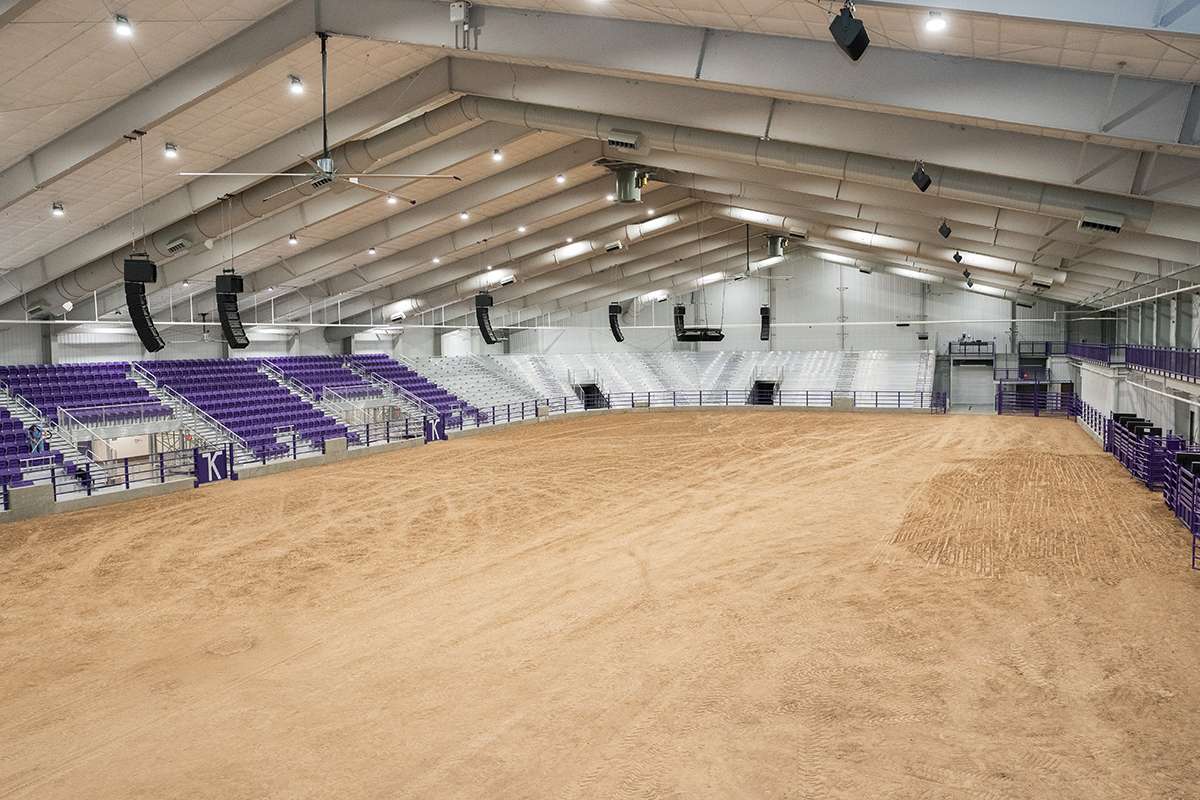
By Pat Melgares
Division of Communications and Marketing
MANHATTAN — The opening of Kansas State University's Bilbrey Family Event Center provides obvious benefits for the university's equine and livestock sciences, but the facility also expands the university's educational and engagement capabilities in Manhattan, the state of Kansas and beyond.The first facility to be completed in K-State's $210 million Agriculture Innovation Initiative had a ribbon-cutting ceremony on Oct. 10 at the site, located on the north side of the Manhattan campus off Kimball Avenue.
The Bilbrey Family Event Center features the 130-by-250-foot Tee Jay Quarter Horses Walker Family Arena with bleacher seating for 3,000 people as well as stock pens, a staging area, covered livestock wash racks, an office and meeting room, restrooms with showers, a first aid and security room, a lobby area with concession capabilities and a VIP lounge overlooking the arena. Teresa Douthit, the interim department head of animal sciences and industry, said the center will allow the university to extend learning outside of a classroom."We will use this facility to support and demonstrate concepts introduced in our courses," Douthit said. "The Bilbrey Family Event Center will facilitate live animal demonstrations and observations and allow learners to practice skills through clinics and hands-on activities that can't be accomplished in a lecture hall." K-State already has plans to hold some university classes at the center beginning in the spring 2025 semester.
Designed for outreach and engagementWith the center ready for use, it opens doors for the university to attract new events, visitors and partners from around the region and throughout the U.S. K-State plans to host approximately 40 events annually at the Bilbrey Family Event Center.These activities include popular university events — among them the K-State Rodeo, Little American Royal, Cattlemen's Day, Junior Beef Producer Days and Swine Day — in addition to new youth activities and industry events."The Bilbrey Family Event Center represents Kansas State University's commitment to serving not just our students, but communities across Kansas and the entire region," said K-State President Richard Linton. "This facility will welcome thousands of young people each year through 4-H competitions, FFA events and livestock shows — many of whom will experience our campus for the first time and discover the opportunities that await them in agriculture."Student organizations will also be able to present educational demonstrations, learning opportunities and community programs at the center.
Dan Moser, interim Eldon Gideon dean of the College of Agriculture, said the new facility will attract many future students to the Manhattan campus and community."We greatly appreciate the support of our donors to grow awareness of our academic programs and the many career opportunities in agriculture and natural resources," Moser said. The Bilbrey Family Event Center is possible through the support of individuals and corporate partners, including JP and Teresa Bilbrey of the Doubling Gap Ranch in Newville, Pennsylvania, for whom the facility is named."
By creating a venue where industry leaders, K-State Extension educators and families can come together, we're strengthening the vital connection between the university and the agricultural communities we're proud to serve," Linton said. "This is exactly the kind of investment that fulfills our land-grant mission and creates lasting value for all Kansans."Students say rodeo facilities are 'amazing'Madeline Meyer, president of the K-StateRodeoteam, which hosts a major indoor event each February, said the competition arena is "absolutely amazing.""Every detail has been thoughtfully designed, from the beautiful roping and bucking chutes to the seating, concessions and even the footing within the arena," said Meyer, a senior from Ellensburg, Washington, who competes in breakaway roping. "One of the biggest advantages we have now with the opening of this facility is the opportunity to practice year-round," she said. "With Kansas weather, we often face extreme cold, heat or rainfall, which can make training very difficult. Having a climate-controlled, dry practice space all year long is incredibly valuable for the growth and development of our athletes."



